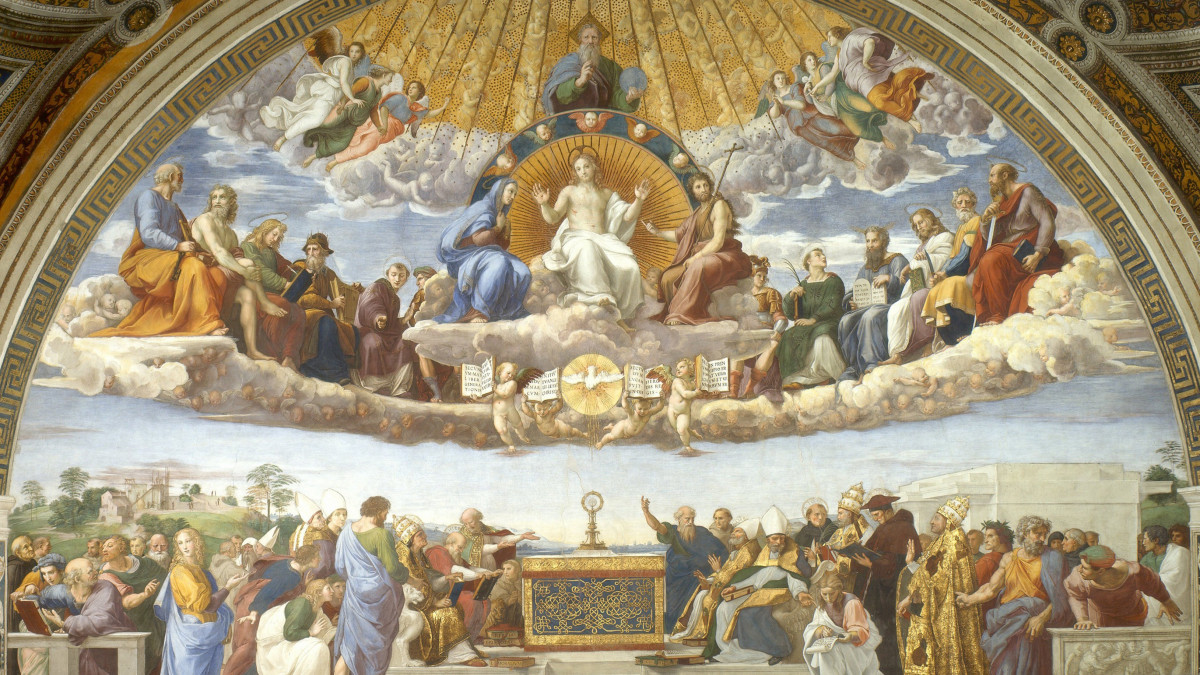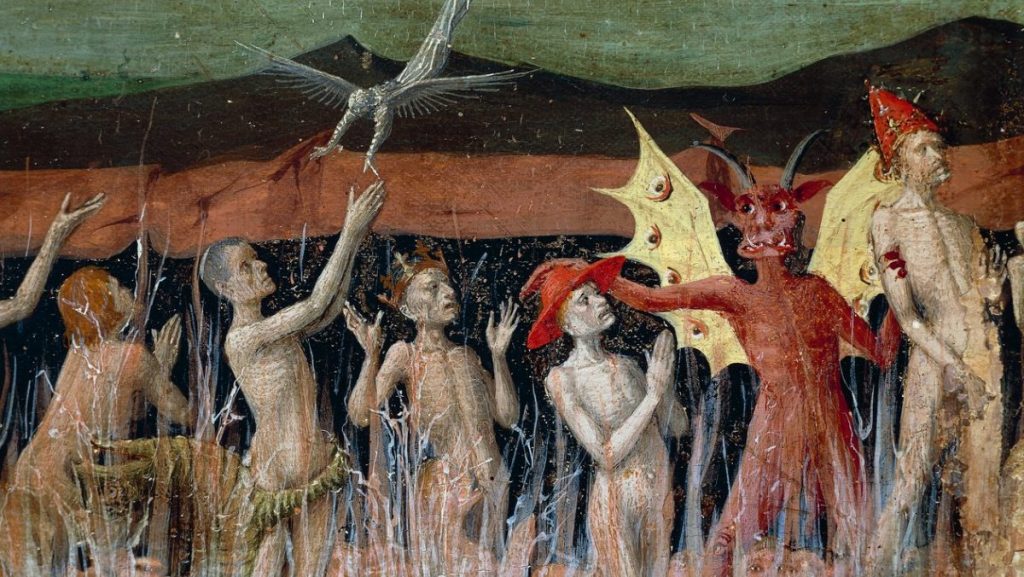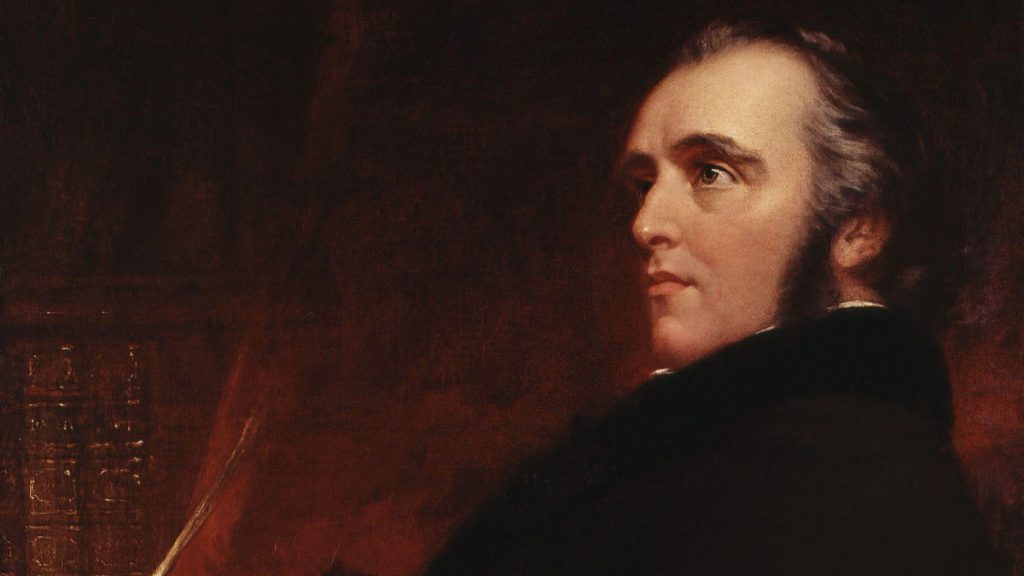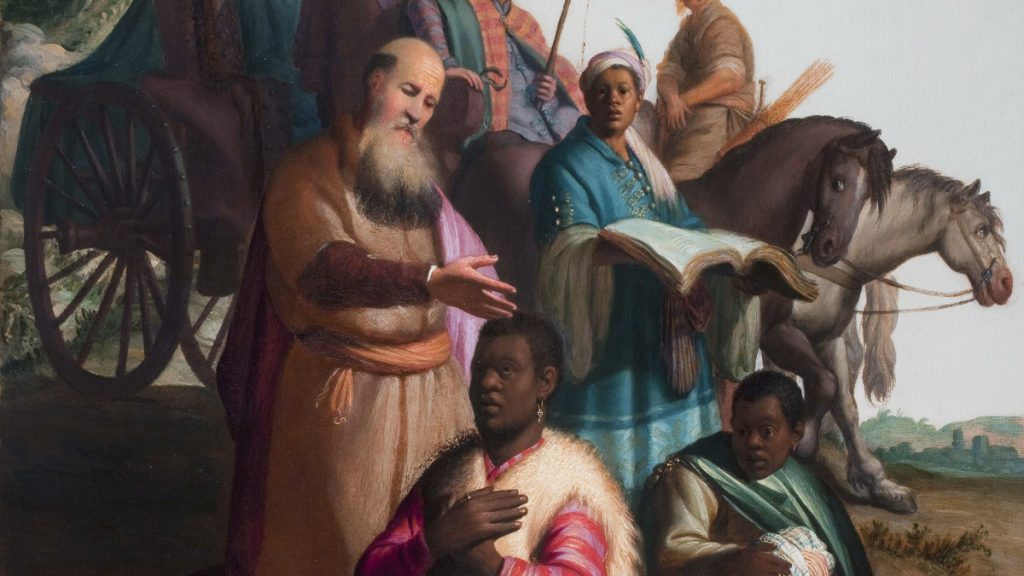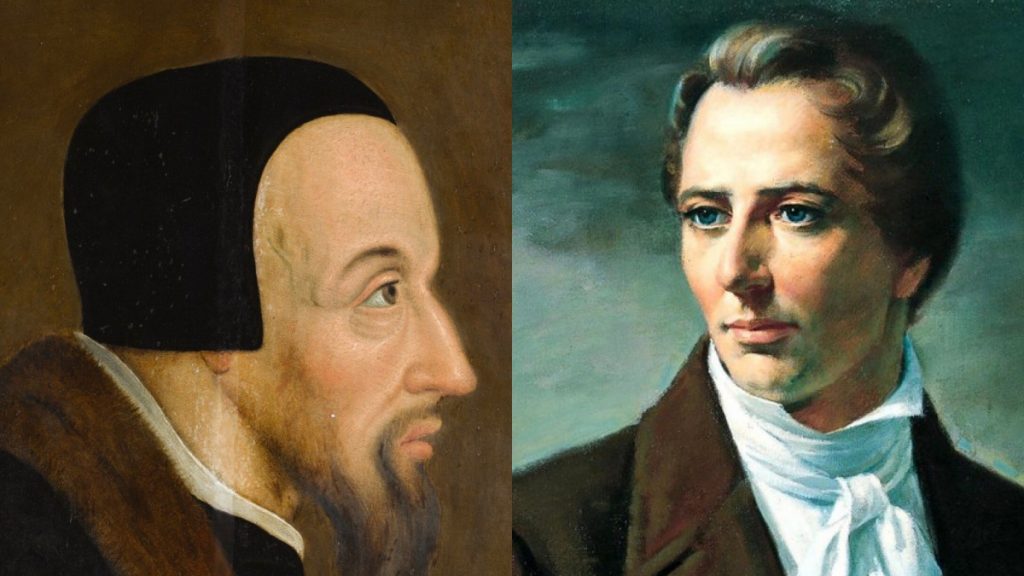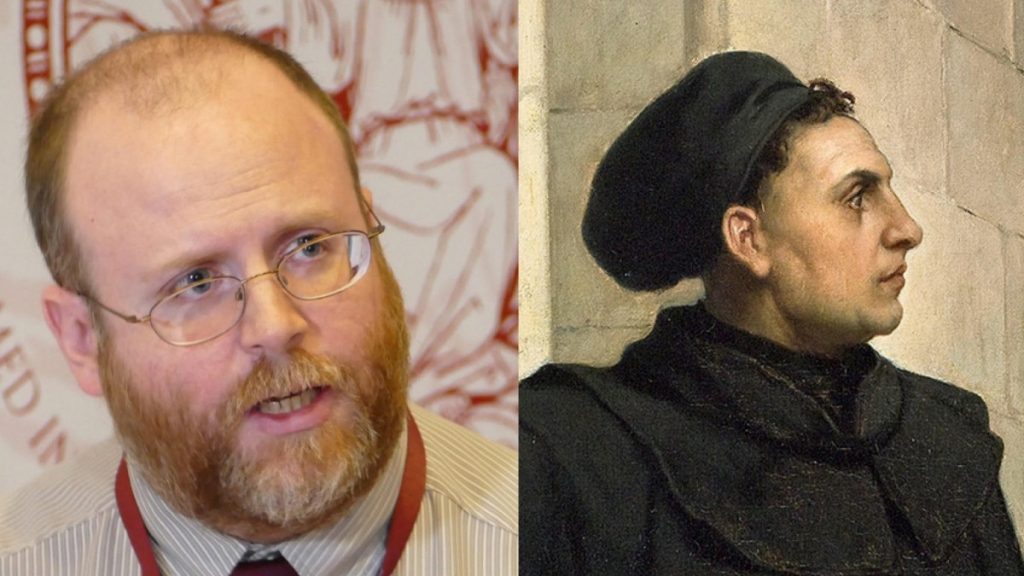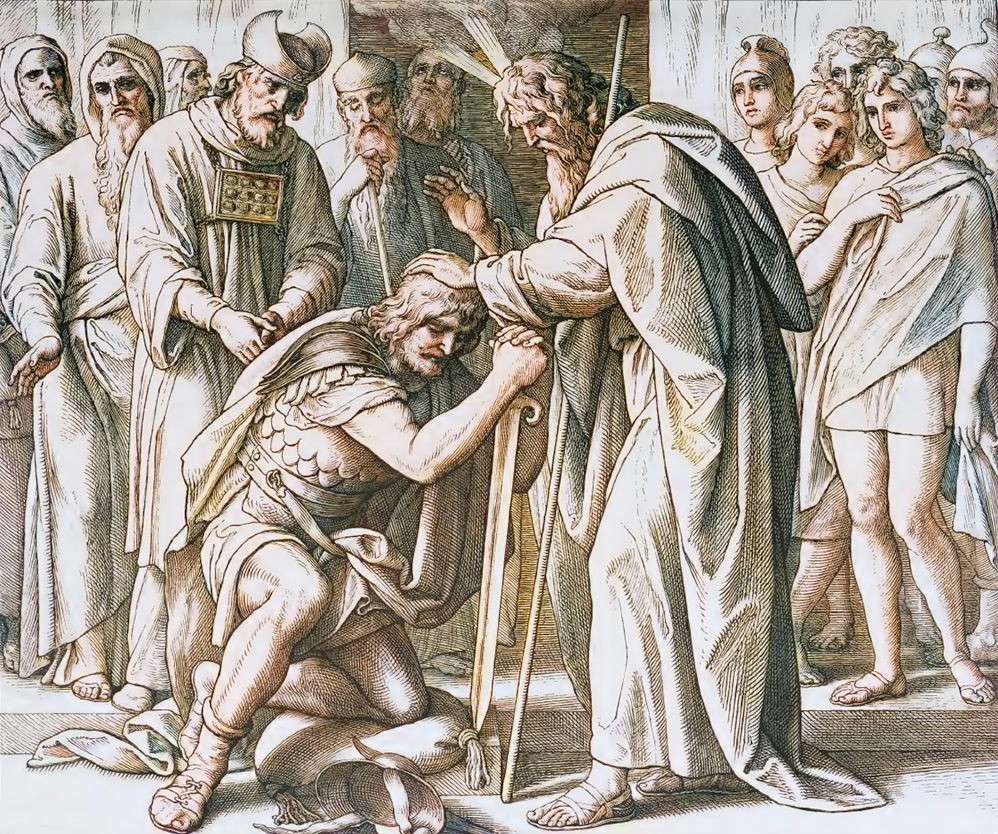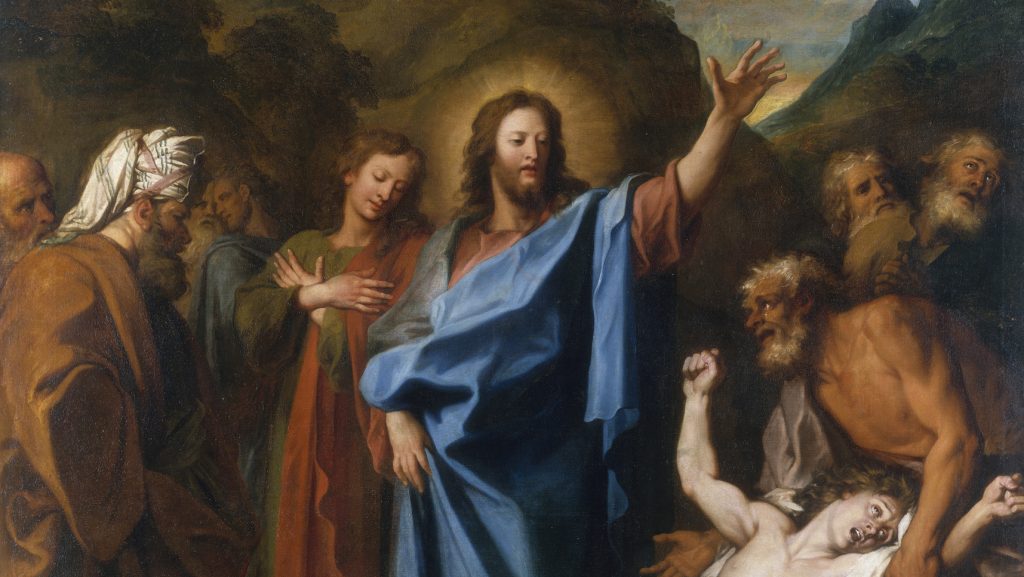As I have outlined, the key catalytic moment when, for the first time, I had to seriously consider the proposition that the Catholic Church is the true Church founded by Jesus Christ, was when I read the Church Fathers. Some of the earliest ones, men discipled by the Apostles themselves, said some extraordinarily Catholic things. So I felt duty-bound to investigate further. Several thousands pages later, I could only conclude that I had to become Catholic—a conclusion that initially angered and depressed.
One of the things that comes through so clearly, so universally in the Church Fathers, is the idea that at the center of Christian worship is a sacrifice—the Eucharist, the bread and wine that has become the Body and Blood of our Lord Jesus Christ. In the ultimate picture of grace, God Himself has made it possible for us to offer Him to Him, and doing so cleanses us, in some mysterious way. This basic belief was present from the very beginning of Christianity.
Now, there are many myths about the Catholic beliefs about the Eucharist. Perhaps the worst is that the Church believes the Eucharist is a re-crucifixion of Jesus at every Mass, on every altar. That is not true. The Catholic Church teaches and believes, and has always taught and believed, that Christ died once for all on the cross, and that He instituted the sacrifice of the Eucharist as the new Passover of the Messianic people, i.e. Christians. We have left Egypt (sin, death), and we are on our way to (we hope) Heaven (the Promised Land), and the Eucharist is both sacrifice and sustenance for the journey as the manna was for the children of Israel in the wilderness (hence why Jesus calls himself the “manna from heaven”). The one and only bloody oblation (i.e. involving death) was on the cross. The unbloody (not involving any death) sacrifice of the Eucharist will continue until the return of the Lord. This distinction was already present in the Old Covenant—not all sacrifices involved death. Christ definitively brought such sacrifices to an end. But the Eucharist is the fulfillment of every other sacrifice, which were given for both reparation of sin, as well as thanksgiving. This is indeed the meaning of the word “Eucharist,” thanksgiving.
Going into all the depths of this teaching is not possible in this one post. So I will simply present a variety of quotes from Church Fathers from the first through fifth centuries, East and West, who testify to the universal (Catholic) belief that the offering and partaking of the Eucharist was, as the new Passover of the fulfilled people of God (Christians), their center of worship. In future posts, I will follow-up in much more detail on the biblical basis for these beliefs. The Catholic Catechism presents this teaching with wonderful clarity and depth, but paragraph 1323 provides a good summary:
At the Last Supper, on the night he was betrayed, our Savior instituted the Eucharistic sacrifice of his Body and Blood. This he did in order to perpetuate the sacrifice of the cross throughout the ages until he should come again, and so to entrust to his beloved Spouse, the Church, a memorial of his death and resurrection: a sacrament of love, a sign of unity, a bond of charity, a Paschal banquet “in which Christ is consumed, the mind is filled with grace, and a pledge of future glory is given to us.”
Indeed, this memorial sacrifice is also like the Passover in that at every Passover meal, the head of a Jewish family will remember the events of the Exodus of speak of his participation in them in the first person. In other words, the Passover is celebrated as if those at the table were in Egypt themselves. The Catholic Catechism, paragraph 1364, explains this:
In the New Testament, the memorial takes on new meaning. When the Church celebrates the Eucharist, she commemorates Christ’s Passover, and it is made present the sacrifice Christ offered once for all on the cross remains ever present. [Cf. Heb. 7:25-27] “As often as the sacrifice of the Cross by which ‘Christ our Pasch has been sacrificed’ is celebrated on the altar, the work of our redemption is carried out.” [Cf. 1 Cor. 5:7]
Finally, before proceeding to the patristic evidence, I will quote a section of the book of Malachi often cited by Church Fathers in support of this idea, Malachi 1:11 to be precise. However, I will quote both verses 10 and 12 as well, to provide appropriate context. Notice that in verse 12, it refers quite explicitly to “the Lord’s table,” and “the food for it,” all in the context of a sacrifice that is offered “among the nations” (i.e. Gentiles):
10 Oh, that there were one among you who would shut the doors, that you might not kindle fire upon my altar in vain! I have no pleasure in you, says the Lord of hosts, and I will not accept an offering from your hand. 11 For from the rising of the sun to its setting my name is great among the nations, and in every place incense is offered to my name, and a pure offering; for my name is great among the nations, says the Lord of hosts. 12 But you profane it when you say that the Lord’s table is polluted, and the food for it may be despised.
And now, a mere smattering of evidence from the ancient Church.
Evidence from the Church Fathers
Didache, 14 (c. AD 50) (West/East)
Assemble on the Lord’s day, and break bread and offer the Eucharist; but first make confession of your faults, so that your sacrifice may be pure. Anyone who has a difference with his fellow is not to take part until he has been reconciled, so as to avoid profaning the sacrifice [Matt. 5:23-24]. For this is the offering of which the Lord said, “Everywhere and always bring me a sacrifice that is undefiled, for I am a great king, says the Lord, and my name is the wonder of nations” [Mal. 1:11, 14]
Pope Saint Clement I, Letter to the Corinthians, 44:4-5 (AD 70) (West/East)
Our sin will not be small if we eject from the episcopate those who blamelessly and holily have offered its sacrifices. Blessed are those presbyters who have already finished their course, and who have obtained a fruitful and perfect release.
Saint Ignatius of Antioch, Letter to the Philadelphians, 4 (c. AD 110) (East)
Take heed, then, to have but one Eucharist For there is one flesh of our Lord Jesus Christ, and one cup to [show forth] the unity of his blood; one altar; as there is one bishop, along with the presbytery and deacons, my fellow servants; that so, whatsoever you do, you may do it according to [the will of] God.
Saint Justin Martyr, Dialogue with Trypho, 41 (c. AD 155) (West)
Hence God speaks by the mouth of Malachi, one of the twelve [prophets], as I said before, about the sacrifices at that time presented by you: “I have no pleasure in you, says the Lord; and I will not accept your sacrifices at your hands: for, from the rising of the sun unto the going down of the same, my name has been glorified among the Gentiles, and in every place incense is offered to my name, and a pure offering: for my name is great among the Gentiles, says the Lord: but you profane it” [Mal. 1:10-12]. [So] he then speaks of those Gentiles, namely us, who in every place offer sacrifices to him, that is, the bread of the Eucharist, and also the cup of the Eucharist
Saint Irenaeus of Lyons, Against Heresies, 4:17:5 (c. AD 180) (West/East)
He took from among creation bread, and gave thanks, saying, “This is my body.” [Matt. 22:26; Mark 14:22; Luke 22:19; 1 Cor. 11:24] The cup likewise, which is from among the creation to which we belong, he confessed to be his blood. He taught the new sacrifice of the new covenant, of which Malachi, one of the twelve [minor] prophets, had signified beforehand: “You do not do my will, says the Lord Almighty, and I will not accept a sacrifice at your hands. For from the rising of the sun to its setting my name is glorified among the Gentiles, and in every place incense is offered to my name, and a pure sacrifice; for great is my name among the Gentiles, says the Lord Almighty” [Mal. 1:10-11]. By these words he makes it plain that the former people will cease to make offerings to God; but that in every place sacrifice will be offered to him, and indeed, a pure one, for his name is glorified among the Gentiles.
Saint Cyprian of Carthage, Letters, 62:14 (AD 253) (West)
For if Jesus Christ, our Lord and God, is himself the chief priest of God the Father, and has first offered himself a sacrifice to the Father, and has commanded this to be done in commemoration of himself, certainly that priest truly discharges the office of Christ, who imitates what Christ did; and he then offers a true and full sacrifice in the Church to God the Father, when he proceeds to offer it according to what he sees Christ himself to have offered.
Saint Serapion of Thmuis, Sacramentary of Serapion, 13:3 (c. AD 350) (East)
Accept therewith our hallowing too, as we say, “Holy, holy, holy Lord Sabaoth, heaven and earth are full of your glory.” [Is. 6:3] Heaven is full, and full is the earth, with your magnificent glory, Lord of virtues. Full also is this sacrifice, with your strength and your communion; for to you we offer this living sacrifice, this unbloody of oblation.
Saint Cyril of Jerusalem, Catechetical Lectures, 23:7-8 (c. AD 350) (East)
Then having sanctified ourselves by these spiritual hymns, we beseech the merciful God to send forth his Holy Spirit upon the gifts lying before him; that he may make the bread the body of Christ, and the wine the blood of Christ; for whatever the Holy Spirit has touched is surely sanctified and changed. Then, after the spiritual sacrifice, the bloodless service, is completed, over that sacrifice of propitiation we entreat God for the common peace of the Churches, for the welfare of the world; for kings; for soldiers and allies; for the sick; for the afflicted; and, in a word, for all who stand in need of succor we all pray and offer this sacrifice.
Saint Gregory of Nazianzen, Letter to Amphilochius, 171 (c. AD 383) (East)
[C]ease not both to pray and to plead for me when you draw down the Word by your word, when with a bloodless cutting you sever the body and blood of the Lord, using your voice for the sword.
Saint Ambrose of Milan, Commentaries on Twelve Psalms of David, 38:25 (c. AD 389) (West)
We saw the prince of priests coming to us, we saw and heard him offering his blood for us. We follow, because we are able, being priests, and we offer the sacrifice on behalf of the people. Even if we are of but little merit, still, in the sacrifice, we are honorable. Even if Christ is not now seen as the one who offers the sacrifice, nevertheless it is he himself who is offered in sacrifice here on earth when the body of Christ is offered. Indeed, to offer himself he is made visible in us, he whose word makes holy the sacrifice that is offered.
Saint John Chrysostom, The Priesthood, 3:4 (c. AD 388) (East)
For what you see the Lord sacrificed, and laid upon the altar, and the priest standing and praying over the victim, and all the worshipers empurpled with that precious blood, can you then think that you are still among men, and standing upon the earth? Are you not, on the contrary, immediately translated to heaven?
Saint John Chrysostom, Homilies on Romans, 8 (c. AD 391) (East)
Reverence now, oh reverence, this table of which we all are partakers! [1 Cor. 10:16-18] Christ, who was slain for us, the victim who is placed thereon!
Saint John Chrysostom, Homilies on First Corinthians, 24:3 (c. AD 392) (East)
“The cup of blessing that we bless, is it not a communion of the blood of Christ?” [1 Cor. 10:16] Very persuasively spoke he, and awfully. For what he says is this: “This that is in the cup is what flowed from his side, and of that do we partake.” But he called it a cup of blessing, because holding it in our hands, we so exalt him in our hymn, wondering, astonished, at his unspeakable gift, blessing him, among other things, for the pouring out of this self-same draught that we might not abide in error: and not only for the pouring it out, but also for imparting it to us all. “Wherefore if you desire blood,” says he, “redden not the altar of idols with the slaughter of brute beasts, but my altar with my blood.” Tell me, what can be more tremendous than this?
And in the old covenant, because they were in an imperfect state, the blood they used to offer to idols he himself submitted to receive, that he might separate them from those idols; which was a proof of his unspeakable affection: but here he transferred the service to what is far more awful and glorious, changing the very sacrifice itself, and instead of the slaughter of irrational creatures, commanding to offer up himself.
Saint John Chrysostom, Homilies on Hebrews, 17:6 (c. AD 403) (East)
What then? Do we not offer every day? We offer indeed, but making a remembrance of his death, and this [remembrance] is one and not many. How is it one and not many? Because that [sacrifice] was one for all offered, [and] carried into the holy of holies. This is a figure of that [sacrifice] and a remembrance. For we always offer the same, not one sheep now and tomorrow another, but always the same thing: so that the sacrifice is one. And yet by this reasoning, since the offering is made in many places, are there many Christs? But Christ is one everywhere, being complete here and complete there also, one body. Even while offered in many places, he is one body and not many bodies; so also [he is] one sacrifice.
Saint Augustine of Hippo, Letters, 98:9 (AD 408) (West)
Was not Christ once for all offered up in his own person as a sacrifice? And yet, is he not likewise offered up in the sacrament as a sacrifice, not only in the special solemnities of Easter, but also daily among our congregations; so that the man who, being questioned, answers that he is offered as a sacrifice in that ordinance, declares what is strictly true?
Saint Augustine of Hippo, City of God, 17:20 (c. AD 419) (West)
For when he says in another book, which is called Ecclesiastes, “There is no good for a man except that he should eat and drink” [Ecc. 2:24], what can he be more credibly understood to say [prophetically] than what belongs to the participation of this table, which the mediator of the New Testament himself, the priest after the order of Melchizedek, furnishes with his own body and blood? For that sacrifice has succeeded all the sacrifices of the Old Testament, which were slain as a shadow of what was to come…Because, instead of all these sacrifices and oblations, his body is offered and is served up to the partakers of it.
Saint Sechnall of Ireland, Hymn in Praise of Saint Patrick, 13 (c. AD 444) (West)
[Saint Patrick] proclaims boldly to the [Irish] tribes the name of the Lord, to whom he gives the eternal grace of the washing of salvation; for their offenses he prays daily unto God; for them also he offers up to God worthy sacrifices.
